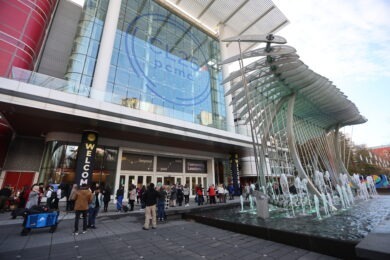The Center for Association Leadership (ASAE) Annual Meeting in Toronto opened bright and early Aug. 13 with a selfie—a critical look at what the organization stands for and what it will not stand by and accept. John Graham, ASAE president and CEO, walked on stage to take a photo of the 4,500 attendees (registration beat projections by 63 people) and then launched into a rejection of discrimination in all its forms.
“Our industry stands for a welcoming and inclusive environment for all. We cannot support the idea of a travel ban, especially a ban aimed at those of a specific nationality or faith,” he said.
The same is true of vetting so severe that it discourages people from visiting some cities to attend conferences. “It is not only bad for the country, but detrimental to the free flow of ideas,” Graham said. The fear of not being allowed into a country or back out once in has a negative effect on conference attendance and progress, he warned. The stifling of ideas is particularly felt in the medical and scientific world, where sharing research is a crucial step in developing cures.
This was a sentiment that was immediately welcomed on social media. Many attendees took to Twitter and the conference app to thank the association for taking a stand.
As an organization, ASAE has a policy to not hold a meeting in a city where discriminatory laws are in effect, but he said he understood that some organizations don’t have a choice if that is where their membership lives. “We do not impose our position on others,” he clarified in a press conference. “We also understand that the people hurt by the loss of business are often the front line workers, the people who clean rooms and drive taxis rather than the politicians. We don’t want to hurt them, but it is a matter of values.”
Graham also said that laws requiring people to use the bathroom of the gender on their birth certificate are discriminatory, and shared ASAE’s lobbying efforts in Austin, Texas, to stop them. “We will fight any legislation that makes our country, or any place, less than welcoming for all,” he said. “This requires constant vigilance.”
He was aware that the location of the meeting—Toronto, a globally diverse city where fully half the residents were born in another country—is known for being very open and welcoming to all cultures. “The decision was made to hold it here in 2010, before we could have imagined that travel bans would be an issue, but it is very fitting,” he said.
The official theme for the conference was “What Inspires,” a sentiment that encourages people to focus on positive things, which Graham said is “needed particularly now, when we have a lack of civility in a lot of circles.”
Graham said his inspiration comes from being able to work in a diverse community that has such an impact on the quality of everything from the food we eat to what we wear, the roads we drive on and the medicines we take. “Association play a key role in maintaining our quality of life,” he said. “And everything we do [advocacy, education platforms, risk management, research studies, assessment tools and events] is designed to help our members be more productive. That is very inspirational.”
As the conference was preparing for its last day, Graham was looking forward to 2018 in Chicago, a city known by many as “the Heart of America.”




